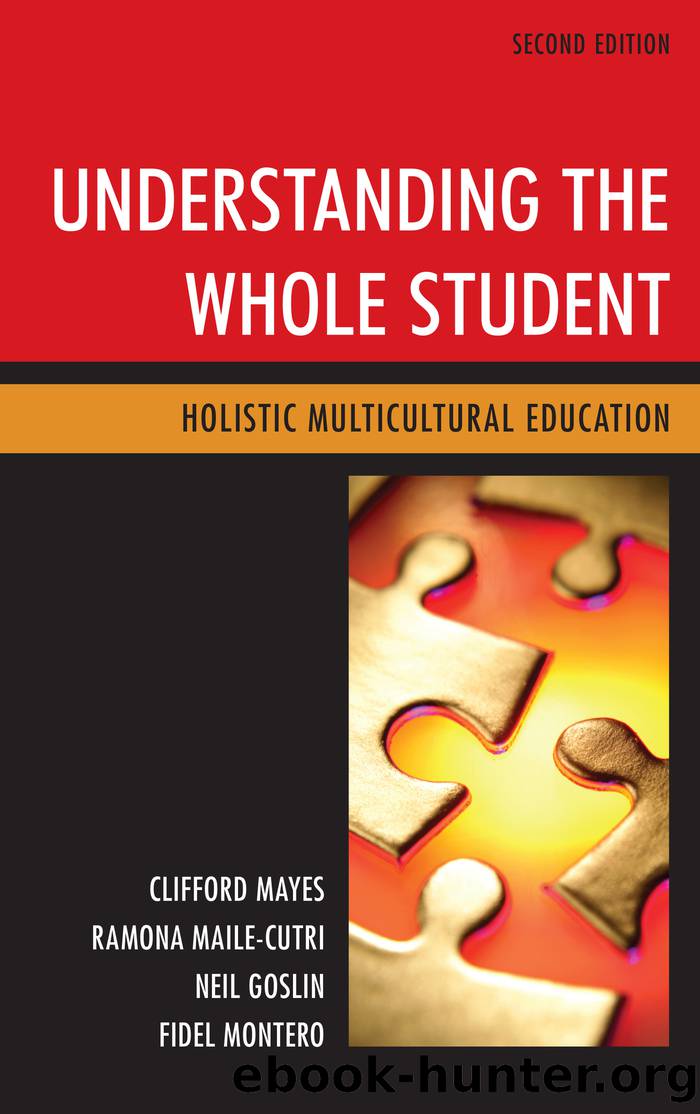Understanding the Whole Student by Mayes Clifford ;Cutri Ramona Maile;Goslin Neil;Montero Fidel;

Author:Mayes, Clifford,;Cutri, Ramona Maile;Goslin, Neil;Montero, Fidel;
Language: eng
Format: epub
Tags: undefined
Publisher: Rowman & Littlefield Publishers
Published: 2012-08-15T00:00:00+00:00
various types of body language and degrees of physical closeness;
certain words, expressions, and even grammatical forms that one will use depending upon the person with whom one is talking; and even
different visions of oneâs place and purpose in the universe.
The psychologist Paolo Ferrucci has suggested the breathtaking emotional complexity inherent in our many roles in declaring that âeach of us is a crowd!â (1982, p. 47), and all of this just in the course of sixteen hours in one day. Over a lifetime, the interaction of culture, role, identity, and emotion grows colossally complex and consequential for almost every individual.
Multicultural students are often required to play so many different roles during the day that it might well boggle the mind of a person from a dominant culture to consider. The multiple roles played by multicultural students in one day potentially involve at least three types of languageâthe language spoken at home, the language spoken by teachers and administrators, and the language spoken by peers. Being able to perform in different languages and dialects on demand is called âcode switching.â
Educators who are aware of these complex and impressive psycho-social abilities in their multicultural students will be more ready and able to harness these strengths in classroom work.
Contrary to the popular understanding of a role, it is not a prescribed list of behaviors but rather a ârepertoire of possibilitiesâ upon which a person can draw as he finds himself âpositionedâ in various situations throughout the day and throughout his life. Thus, our roles make it possible for us to navigate the world with relative efficiency because they offer âpredictive and sense-making capacitiesâ that do not envisage every possibility but that do make it unlikely that much will happen that is not expectable (Hewitt, 1984, p. 62). Roles provide âtypificationsâ that help us know what to expect from and feel about ourselves and others in certain situations.
When a person is thrown into a social situation in which his role is either unclear to him or awkward for him because it varies so much from his cultural norms, then he may feel considerable anguish and be unable or unwilling to performâan important fact to consider, as we shall see, when trying to understand the experiences of children from minority cultures in classrooms where the rules and roles of the typical American classroom may differ greatly from the rules and roles that they knew and were expected to conform to in their native cultures.
Download
This site does not store any files on its server. We only index and link to content provided by other sites. Please contact the content providers to delete copyright contents if any and email us, we'll remove relevant links or contents immediately.
Deep learning with TensorFlow and Keras by Derrick mwiti(898)
Understanding PDA Autism in Kids: A Guide for Parents and Teachers to Support Neurodiverse Learners by Jehu Len(811)
The Victorian Era: A Captivating Guide to the Life of Queen Victoria and an Era in the History of the United Kingdom Known for Its Hierarchy-Based Social Order by Captivating History(603)
Writing Solid Code: Development Philosophies for Writing Bug-Free Programs by Steve Maguire(522)
100 Ideas for Secondary Teachers: Engaging Parents by Janet Goodall & Kathryn Weston(506)
Intersectionality in Educational Research by Dannielle Joy Davis; James L. Olive; Rachelle J. Brunn-Bevel; Susan R. Jones(505)
How to be assertive in any situation by Hadfield Sue & Hasson Gill(496)
Brain Teasers to Build Critical Thinking Skills: Brain Exercises for Tech, Banking, Case Interview Prep, and to Keep Your Mind Sharp by Kris Safarova(483)
Brain Teasers to Build Critical Thinking Skills by Safarova Kris(482)
Python 101 - Fundamentals by Sam(445)
Critical Curriculum Leadership : A Framework for Progressive Education by Rose M. Ylimaki(442)
The Art of Emotional Validation: Improve Your Communication Skills and Transform Your Relationships by Validating Emotions and Feelings by Emily Wright(411)
A Beginner's Guide to SSD Firmware by Unknown(396)
NumPy : From Basic to Advance by bisht Karan Singh(391)
The Knights Templar: An Enthralling History of the Rise and Fall of the Most Influential Catholic Military Order by Wellman Billy(389)
The Future Knowledge Compendium by Ellyard Peter;(386)
What Every Teacher Should Know about Learning, Memory, and the Brain by Tileston Donna E. Walker;(383)
Alma Maters (5th edition) by Unknown(378)
Making Connections in and Through Arts-Based Educational Research by Hala Mreiwed Mindy R. Carter Sara Hashem Candace H. Blake-Amarante(366)
